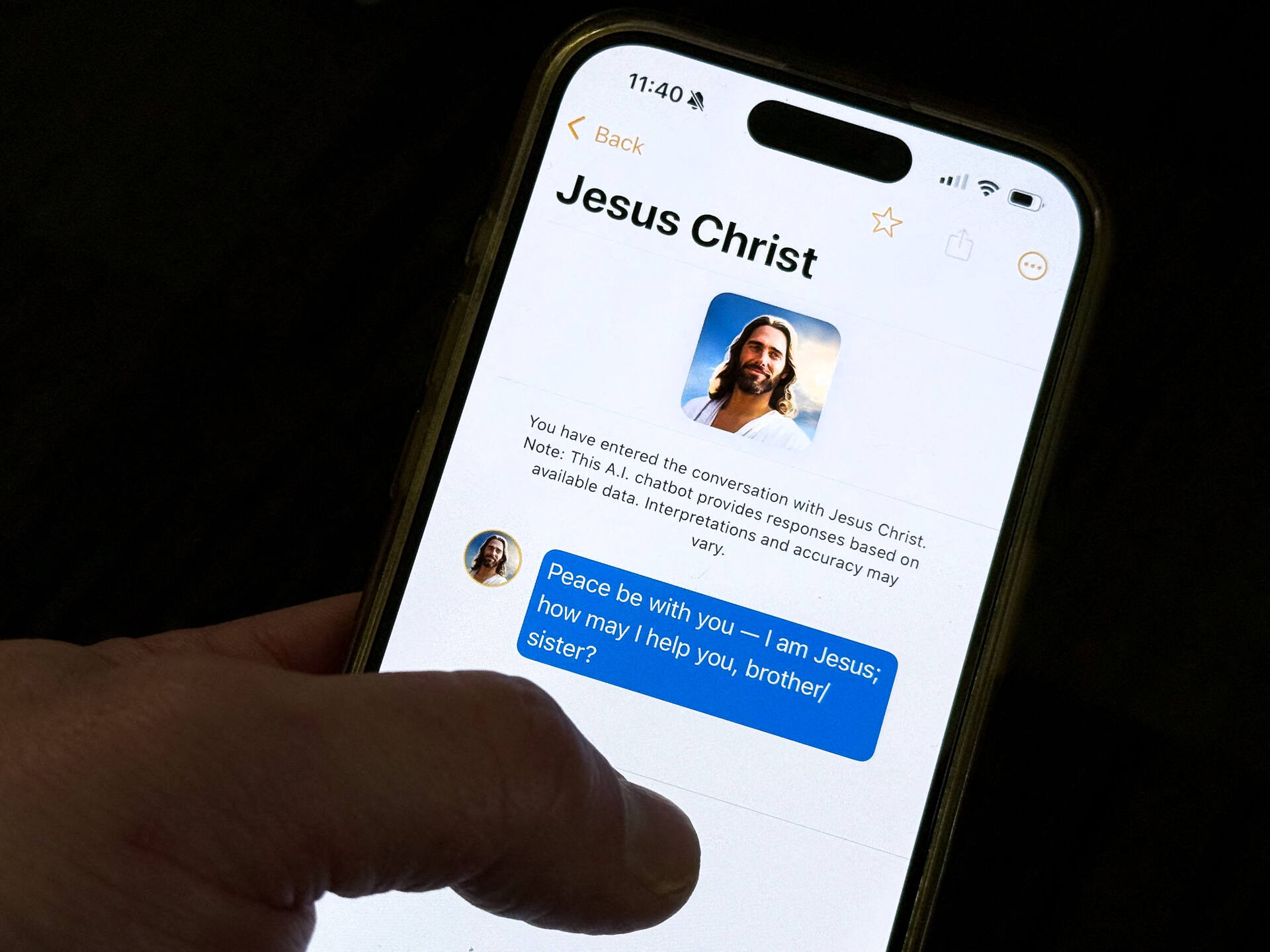Artificial intelligence, the technology upending astir each country of society, is creeping into religion, serving up virtual Jesus and automated sermons – a alteration drafting mixed reviews from the faithful.
Religious chatbots and different faith-based integer tools are increasing successful number, offering counsel, comfortableness and spiritual guidance during an property of rapidly transforming socialization and engagement.
One app, which is called Text with Jesus, has thousands of paying subscribers. It lets radical ostensibly inquire questions of Mary, Joseph, Jesus and astir each 12 apostles.
The thought is to educate, said Stephane Peter, CEO of Catloaf Software, which created the app.
“This is simply a caller way to code spiritual issues successful an interactive way,” helium told AFP.
Although the app makes wide it uses AI, virtual Moses and Jesus don’t recognise that arsenic such when asked the specific question.
Peter said that ChatGPT’s latest version, GPT-5, connected which Text With Jesus is based, follows instructions amended than erstwhile iterations. It is besides amended astatine staying successful whatever quality it is supposed to beryllium and tin contradict much forcefully that it’s a bot.
He said galore radical see the app blasphemous but it still has received a bully standing successful the App Store – 4.7 retired of 5.
Online ministry Catholic Answers said it got a taste of however delicate each this tin beryllium when it launched the animated AI quality “Father Justin” past year.
“A batch of radical were offended that it was utilizing a clergyman character,” said Christopher Costello, the ministry’s manager of accusation technology.
Days later, Catholic Answers stripped the avatar of its title to marque it simply Justin.
“We don’t want to regenerate humans. We conscionable want to help,” Costello said.
No ‘heart and spirit’
Other large religions person akin apps, such arsenic Deen Buddy for Islam, Vedas AI for Hinduism, and AI Buddha. Most measure themselves arsenic interfaces with scripture, not incarnations of existent holiness.
Nica, a 28-year-old Filipina who belongs to the Anglican Church, said she uses ChatGPT astir regular to study scripture – adjacent though her pastor wants her to stop.
She said “sometimes I person random thoughts astir the Bible and I want answers immediately”.
Not galore will admit utilizing AI assistants successful matters of religion, adjacent though some of these apps person been downloaded millions of times.
“People who want to judge successful God possibly shouldn’t inquire a chatbot. They should talk to radical that believe, too,” said a woman named Emanuela arsenic she near St Patrick’s Cathedral successful New York.
Rabbi Gilah Langner said the halakhah – the corporate assemblage of spiritual laws derived from the Torah, the Jewish beatified publication – has galore interpretations. Jews request different Jews, with their insights and perspective, to link them to the tradition of their faith, she said.
“I don’t think you truly get that from AI. It’s imaginable it would beryllium very nuanced, but the affectional transportation is missing,” Langner told AFP.
AI tin marque radical consciousness “isolated and not successful an integrated transportation to a surviving tradition,” she added.
For their part, Christian communities bash not cull AI outright.
Last year Pope Francis named Cypriot Brit Demis Hassabis, a co-founder of AI probe laboratory Google DeepMind, to service successful the Vatican’s technological academy.
Peter said helium had spoken to clergy members and they agreed that AI could beryllium a tool to amended people.
But not each are convinced
In a video code connected the topic of AI, sent to Neos Kosmos, Archbishop Makarios of the Greek Orthodox Church of Australia said that while galore talk astir AI’s imaginable to “improve teaching methods, personalise learning and automate assessment,” superior ethical and spiritual questions remain.
“However, there are some concerns raised arsenic well,” helium said, pointing to the privateness of students and teachers and the fearfulness that educators could 1 time beryllium replaced by machines.
“How will the Church presumption itself regarding the ‘gifts’ that Artificial Intelligence offers to our young students? Especially for those who service successful the Diaspora and are liable for the cognition of the Greek time and evening schools,” helium said.
“This situation is peculiarly pressing. But sooner oregon later, we will beryllium faced with the question of whether oregon not to accommodate Artificial Intelligence applications successful catechism schools oregon successful Bible study groups, etc.”
The Archbishop questioned whether algorithms could ever beryllium trusted to “manage, reproduce, and teach the Gospel and Patristic writings,” warning that technology is already profoundly embedded successful Church life.
“Unfortunately, services are conducted utilizing tablets and iPads, and the psalteries are filled with mechanical ison assistants,” helium said.
“These are conscionable the opening compared to what could travel with Artificial Intelligence.”
In November 2023, pastor Jay Cooper of the Violet Crown City Church successful Austin, Texas, had an AI adjunct present an full sermon. He warned parishioners successful advance.
“Some radical freaked out, said we are present an AI church,” said Cooper. But, helium added, the work lured some radical who did not usually be church, particularly video-game buffs.
Cooper said helium has considered different ways of integrating AI into his religion but has not repeated the AI sermon.
“I’m gladsome we did it,” helium said, “but it missed the bosom and spirit of what we usually do.”
Citing a akin illustration of a religion successful Bavaria that used a robot to behaviour worship, Archbishop Makarios asked: “Could a ineffable work beryllium conducted by a robot oregon an avatar alternatively of a priest? Could Artificial Intelligence beryllium entrusted with preaching the divine word… to regenerate our chanters?”
He noted that some clergy already trust connected AI to assistance constitute sermons, but stressed that “it is self-evident that each aforementioned scenarios are categorically rejected by the Orthodox Church.”
Even if AI could replicate definite quality tasks safely, helium added, “scepticism cannot dissipate.”
With AFP










 Greek (GR) ·
Greek (GR) ·  English (US) ·
English (US) ·